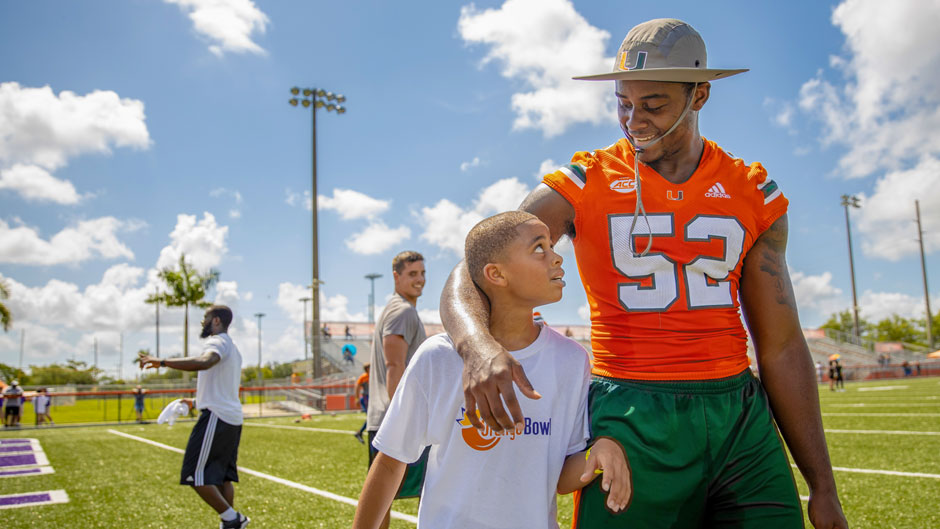HOMESTEAD, Fla. – The game Ephraim Banda has loved for most of his life is still under fire, criticized by some parents and others who say the sport is unsafe because of the risk of head injuries.
But early Wednesday, on a sun-splashed gridiron in South Miami-Dade County, Banda had a message for the naysayers. “There is a safe way of playing this sport,” said the co-defensive coordinator and director of youth development for the Miami Hurricanes football team. “And we’re on a crusade to spread the word and show parents and everyone else that this game is safe and is good for these kids.”
His comments came at the start of the University of Miami football program’s free youth football camp at Homestead’s Harris Field Park, where some 167 youngsters from 5 to 12 years old participated in tackling, blocking, and pass catching drills—all under the tutelage of Hurricane coaches and players.
“We can teach the physical part of the game and still be safe, and our defense is a testament of that,” said Banda, explaining that the shoulder-leverage techniques UM football players use are ideal examples of how to take the head out of the game.
During drills using tackling dummies, special teams graduate assistant Danny Kalter drove home that point to the youngsters he instructed. “We’re gong to tackle like a Miami Hurricane,” he yelled, telling the young campers to use their shoulders instead of the crown of their heads.
Dozens of parents filled the Harris Field Park bleachers, taking pictures of their children with their cellphones.
“They’re excited to see that we’re taking this approach, especially the mothers,” said Banda. “There’s a lot of things being said through social media and through literature and movies that can skew what’s real and what’s not. The biggest thing we’re trying to do is to make sure they understand what (proper technique) looks like, and we do it by giving a free youth camp and coming to their parks instead of trying to get them on our campus, which we know can be a little hard for them.”
The camp was just as rewarding for UM football players, some of whom grew up in South Miami-Dade communities where the campers live.
“I’ve always wanted to do something like this,” said defensive back Trajan Bandy, who started all 13 games for the Hurricanes last season, intercepting three passes and recovering two fumbles. “Having the chance to give back to these kids is a blessing.”
Defensive back DJ Ivey, who attended South Dade High School and grew up in Florida City, called the camp “influential.”
“It means a lot to these youngsters,” he said. “It tells them there’s a way out.”

